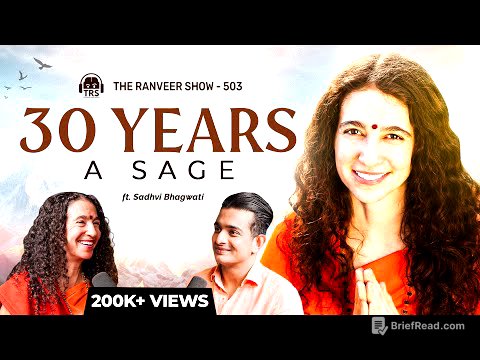TLDR;
The speaker explains why, after seven years in Thailand and multiple proposals, he will never marry a Thai woman. He highlights the financial obligations to the extended family, language barrier affecting deep emotional connection, and differing expectations about marriage. He emphasizes the loss of freedom and potential social isolation post-marriage, and the importance of conscious choice over societal expectations in relationships.
- Financial obligations to extended family can be overwhelming.
- Language barriers hinder deep emotional connection.
- Differing expectations about marriage lead to dissatisfaction.
- Marriage can lead to loss of freedom and social isolation.
- Conscious choice in relationships is better than obligation.
Introduction [0:00]
The speaker states upfront that he will never marry a Thai woman, not out of dislike or distrust, but based on observations over seven years in Thailand. He aims to share insights to help others considering marriage in Thailand, emphasizing that his perspective comes from real-life experiences and recognizing patterns after the honeymoon phase ends.
Financial Obligations to the Extended Family [0:48]
The speaker explains that marrying a Thai woman often means taking on the financial burdens of her extended family. He recounts his experience with his second girlfriend, Nim, where he became the family's ATM, covering expenses for her father's treatment, sister's motorcycle repair, grandmother's house repairs, and cousin's university fees. This is rooted in Thai culture, where those with means are expected to help their family. He warns that this expectation can intensify during crises and persist throughout the marriage, potentially leading to resentment.
Language Barrier and Emotional Connection [2:22]
The speaker discusses how the language barrier affects the deeper aspects of a relationship. Even with decent Thai language skills, he felt he missed emotional nuances. Thai is a high-context language where much communication occurs between the lines. Misunderstandings during important conversations about money, family, or future plans can compound over the years, leading to frustration. He shares an example of his neighbor Dave, whose marriage ended due to the permanent separation caused by the language barrier.
Differing Expectations About Marriage [3:53]
The speaker highlights that differing expectations are a major issue. Thai women often envision stability, security, family care, and raising bilingual children, while foreign men seek adventure, youth, escape from Western relationship drama, and appreciation. These differing visions require serious discussion and compromise, which most couples fail to have early on. He describes a pattern where the first two years are great, but reality sets in by years three and four, leading to friction. By year five, couples either bridge the gap or remain in an unsatisfying marriage.
The Trap of Marriage and Loss of Freedom [5:21]
The speaker warns that marriage can be trapping, especially in a foreign country. Leaving becomes legally, financially, and emotionally complicated. Visa status is tied to the marriage, assets may be in the wife's name, and the social circle is often her family and friends. He has seen men stay in dead marriages due to the difficulty of untangling everything and others lose assets in divorce due to misunderstanding Thai family law. He contrasts the freedom of being single with the constraints of marriage, where the ability to change one's situation is significantly reduced.
Changes in Men After Marriage [6:24]
The speaker observes changes in foreign men after marriage in Thailand. Before marriage, they are often confident, social, and pursuing hobbies. After marriage, they become isolated from other expats, spend time with Thai family, stress about money, and lose their sense of adventure. Marriage alters the power dynamic, and the assumption of permanence can reduce effort in the relationship. Traditional gender roles in Thai culture can also create tension if not aligned with personal values.
Examples of Successful Marriages [7:41]
The speaker acknowledges that some Thai-foreign marriages do work, providing examples of couples who put in significant effort. Tom and Rattana invested heavily in language and cultural understanding before marrying. Jim and Siporn started a business together to test their teamwork and agreed on a budget for family support. Mark and Warry attended couples counseling in both languages and outlined their expectations before the wedding. These couples treated marriage as a business partnership, ensuring compatibility on all levels.
The Speaker's Choice: Conscious Relationships [8:58]
The speaker explains that he prefers deep, meaningful relationships without the complications of marriage. He supports his girlfriend's family by choice, not obligation, and both are free to leave if the relationship becomes unhealthy. He values conscious choice over contractual obligation, which keeps the relationship alive. This allows him to focus on his business, interests, and friendships without navigating complex family dynamics.
Key Learnings and Honesty [10:01]
The speaker concludes that love, attraction, and compatibility are insufficient if there are fundamentally different frameworks about marriage. Foreign men often fall in love with the idea of being with a Thai woman but not the reality of Thai culture and expectations. Thai women may fall in love with the security of marrying a foreigner but not Western individualism. He advocates for complete honesty from day one, stating what he can and cannot offer. His current girlfriend has her own career and independence, and they are together by choice.
Final Thoughts and Considerations [11:57]
The speaker encourages viewers considering marriage to a Thai woman to think it through completely. He asks whether they are marrying because they genuinely want to navigate Thai family culture or because the relationship feels good now. If the latter, he suggests considering whether the current relationship is better than what marriage would offer. He prefers conscious, chosen love over obligated, complicated love.









